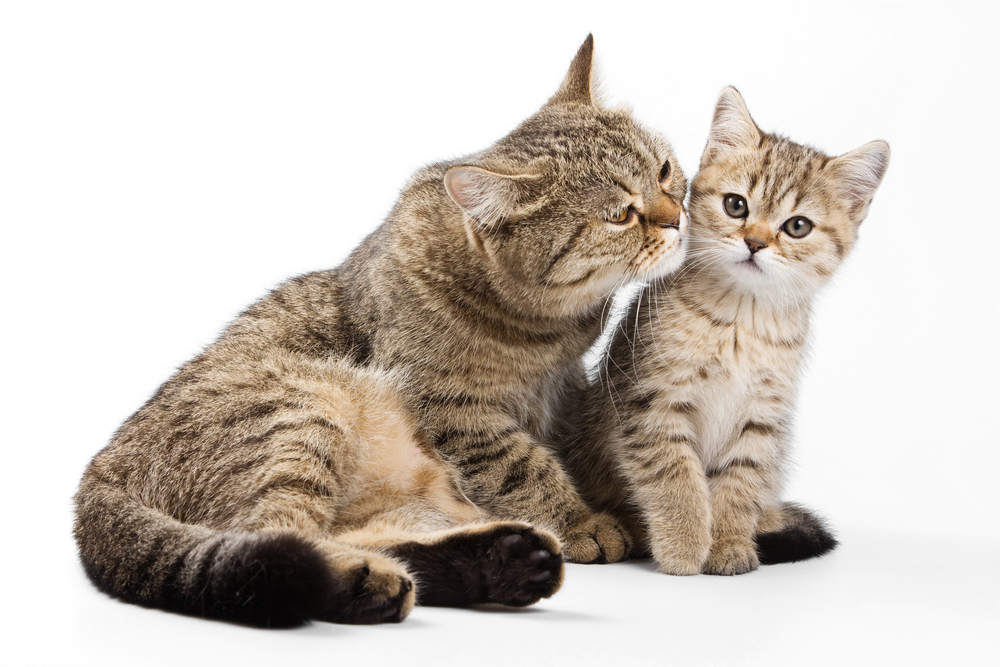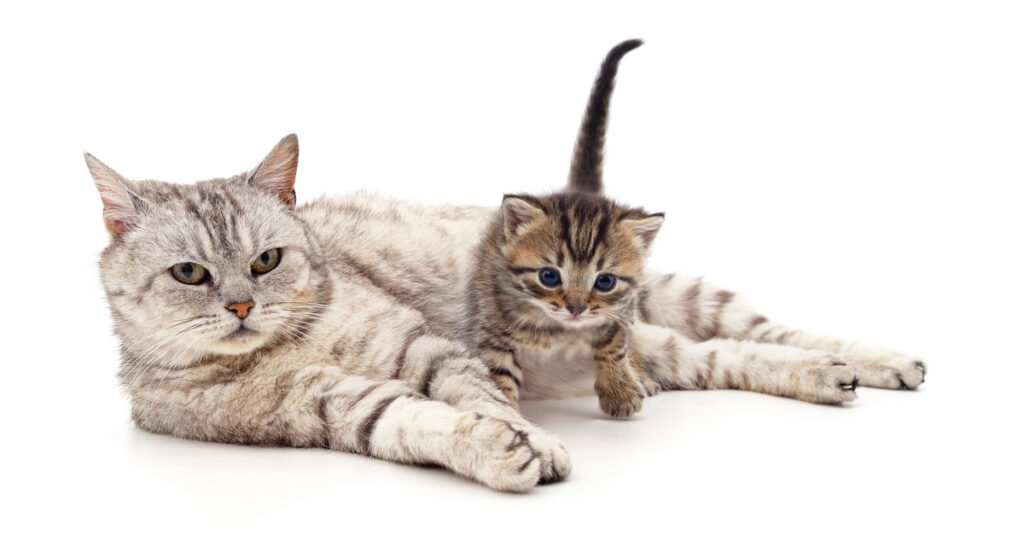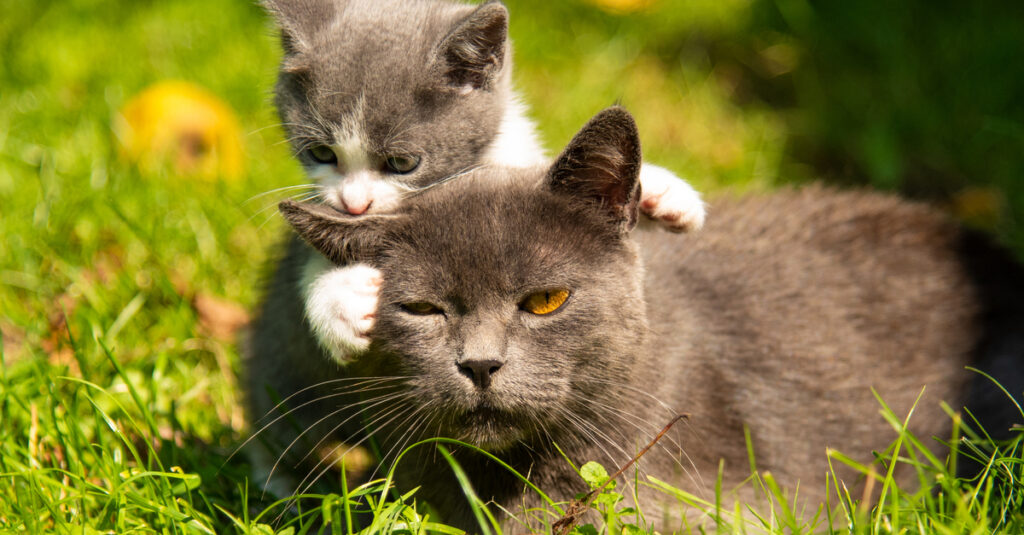Do Mother and Daughter Cats Get Along? All You Need To Know!
Cats can be fickle creatures, which is why it’s a good idea to know how mother cats take care of kittens and also what you need to know if you’re going to take on the responsibility of raising a kitten as your own. Question is, do mother and daughter cats get along?
Yes, mother and daughter cats can get along. In fact, it’s not uncommon for mother cats to share a single litter box with her daughter cats, provided that they are not too crowded.
Grab the Puuurrr-fect Planner to keep track of your cat’s health and well-being ON SALE NOW!

However, some cats will naturally have a better relationship than others, but even then, it’s not always a guarantee that they’ll be able to coexist peacefully.
If the mother is well-socialized, she may be able to accept the kitten’s arrival into her home. However, there are many possible factors that could cause a fight between mother and daughter cats.
Read also: Why Kitten Will Not Leave Older Cat Alone?
Do Mother Cats Play Fight with Their Kittens?
Yes, mother cats play fight with their kittens. It’s a common behavior in the wild, and it’s also seen in domesticated cats. This playful behavior helps the kitten learn how to use its claws and teeth, which they’ll need later in life.
Mother cats will play fight as a way to teach their kittens how to fight, how to hunt, and how to defend themselves.
The mother cat will typically start by chasing her kitten around the room, making sure that she doesn’t really touch them too hard.
She’ll do this so that the kitten knows what it feels like when they’re being chased by another animal. She might even pretend-eat or pretend-scratch at the kitten as she goes after them.
This is all part of training them for what they’ll experience when they’re older and out on their own.
It’s important for kittens to learn how to defend themselves and be able to take care of themselves because once they become adults, they won’t have their mother around anymore!
It’s important for kittens to learn how to defend themselves from predators at this age. This is especially true for feral cats who live outside.
Since these felines often have to fend off other animals like dogs or raccoons looking for an easy meal.
Do Mother Cats Have Favorite Kittens?
Yes, mother cats have favorite kittens, and you can find out which ones they are by reading the signs.
If you have more than one kitten, you may have seen your cat show favoritism toward one or two of them. While she may not be able to express it verbally, a mother cat will show her feelings for her kittens by grooming them or picking them up and cradling them in her mouth.
Grooming is an important way for a mother cat to keep her kittens clean and healthy. She also uses grooming as a form of bonding and communication with her kittens.
When she grooms one kitten more than another, she is probably communicating that kitten’s need for more attention or affection with the other kitten(s).
Why Do Cats Favor One Kitten Over Another?
So why do Mother cats have favorite kittens? This isn’t because they don’t love all their children equally.
They may choose one kitten over another as a way to ensure its survival or because it has qualities that she values more than the others. This means that a mother cat can have more than one favorite kitten in her litter.
Another reason is that it’s hard for them to care for all their kittens equally when there are so many of them!

The more kittens a mother cat has, the less attention she can give each one individually. This means that mother cats who have large litters sometimes develop favorites among their littermates.
This because they feel more comfortable giving extra attention to those kittens than they do to others in the litter.
This doesn’t mean that she loves one kitten more than another or that she loves one kitten less than another, she just has different preferences for which kittens she likes best!
A mother cat will also show favoritism based on temperament and personality traits of each kitten in her litter.
For example, if one kitten is more playful than the others or shows more interest in exploring outside of the nest box or cage.
Then it may receive more attention from momma kitty than other siblings who are less active or curious about their surroundings during this time period such as during playtime when they’re young.
Other factors that determine whether or not a kitten will become the favorite one in the litter include:
- The order in which they’re born
- How much time they spend with their mother before she leaves them at night
- How much attention they get during play time with their siblings
Do Kittens Get Along with Their Mothers as Adults?
Yes, kittens get along with their mothers as adults.
Kittens have a strong bond with their mothers, and they depend on them for food and protection. When the kitten grows up and becomes an adult, this bond is maintained even if the mother is no longer around.
The mother cat continues to care for her young even after they are weaned off breast milk and eating solid food.
Kittens have a strong bond with their mother for the first few weeks of their lives. This bond is so strong that it can last for years after they have grown up.
Kittens have been known to follow their mothers around for years, and even sleep beside them if they are separated from one another.
In fact, it’s common for cats to form tight bonds with their mothers and siblings throughout their lives. This is especially true if they were raised in a single-cat household or fostered by another cat when they were young. Cats are often very loyal to one another, especially when it comes to family members.
A mother cat will protect her kittens from danger and feed them until they are old enough to hunt for themselves. She will also groom them and teach them how to use the litter box.
Are Cats Good Mothers?
Yes. Cats are good mothers. Cats are very protective of their kittens, and they will fight for them if necessary. They also clean newborn kittens by licking them and purring to them.
This helps the kittens develop motor skills, as well as helps stay warm.
Cats also teach their kittens about hunting by taking them outside for short periods of time each day to practice hunting in a controlled environment.
Cats are, in fact, very good mothers.
The way it works is that cats will choose a small box to give birth in. They do this because they want the kittens to be safe and warm during the birthing process.
After the kittens have been born, they’ll begin to nurse them by licking the kittens’ mouths to stimulate them.
The mother cat also grooms her kittens and keeps them clean. The mother cat will also protect her kittens from danger.
They will also try to keep them away from things that she thinks might harm them. For example, other pets in the house.
Read Also: Why Is My Mom Cat Hissing at Her Kittens? [Surprising Facts]
Can Kittens Stay with Their Mother Forever?
Yes, kittens raised in the same household as the mother cat can stay with her forever.

When cats are born, they are blind, deaf, and toothless. They also have no way of getting around on their own. Because of this, kittens rely on their mothers for everything from food to protection from predators.
Cats are very protective parents. They will do anything to keep their babies safe from harm. They will even carry them around in their mouths if they need to move them somewhere else quickly.
While most cats will leave their kittens at about eight weeks old, if the mother cat is still nursing when this happens, she may decide to keep them longer than expected.
It’s important not to interfere with this process because it could cause serious problems for both the kitten and its mother later on down the road.
Adopting A Mother Cat and Her Kitten
You can adopt a mother cat and her kitten. The number of kittens in the litter varies from one to six. But you should be able to find a mother cat and her kittens who are looking for a home. Typically mother cat will be spayed or neutered and vaccinated, so she’ll be ready to go home with you.
You should also consider how many other animals you have in your home before adopting a mother cat and her kittens.
If your home already has dogs, cats or other types of pets. It may not be a good idea to add more animals at once because they may get jealous of each other’s attention.
Or even fight over food if they’re feeling territorial. However, if you live alone with no other pets, then this shouldn’t be much of an issue.
When adopting a mother cat and its kitten, it’s important to also consider the following:
- the age of the kittens
- the age of the mother cat
- the overall health of the mother cat and kittens
- whether or not they have been vaccinated
Do Mother Cats Get Sad When Their Kittens Are Taken Away?
It’s hard to watch a mother cat get sad when her kittens are taken away, but it’s important to understand why she feels that way.
Cats and their kittens bond closely together and form a strong emotional connection. When they’re separated, the mother cat may become depressed or even ill.
The bond between mother cats and their kittens is very strong and it’s similar to that of human mothers who are separated from their children when they’re young.
If you take your kitten away from its mother before it’s old enough to be on its own, it can cause both of them a lot of stress and pain.
According to a study done by researchers at the University of California at Davis, mother cats do indeed feel sadness when their kittens are taken away.
The study followed ten mother cats over a period of three months. Half of these cats were allowed to keep their kittens until they were weaned at about six weeks old. While the other half had their kittens removed after only one week.
They found that in both cases, there was an increase in stress hormones in the mother cats’ blood during this time period but only for those who had lost their young before weaning.
The study also found that even though these same mothers were still lactating at this point and could have continued raising their young’s longer with another litter, they did not seem to show any interest in having more kittens.
Is It Okay to Let My Other Cat Near a Mother Cat and Her Kittens?
No! It’s not okay to let your other cat near a mother cat and her kittens.
It’s very important to keep your cats separated at all times, especially when you have a pregnant cat in the house.
The reason for this is because cats can be very territorial, and when they feel threatened or scared. they may attack and hurt your other pets or even their own offspring.
Cats need plenty of space for themselves away from other animals in order to feel safe and secure. If you want to allow your new kitten to hang out with the rest of the cats in the house.
Make sure that you always supervise them and move them away from each other if things get too close for comfort.
Mother Cat with Kittens Behavior
The behavior of a mother cat with kittens is very different than the behavior of a mother cat without kittens.
When a mother cat has kittens, she is typically very protective. She will hiss and scratch at anyone who comes near her or her kittens. If you try to touch her or her babies, she might even bite you!
They will often carry them around in their mouths, and they will also groom and clean their kittens. When the mother cat brings her kittens back to the nest. She will often sniff them all over and lick them to check that they are okay.
Mother cats also use their body language to show how they feel about their kittens. For example, if a mother cat is happy, she will hold her tail up high in the air and wag it from side to side. If she is angry or scared, on the other hand, she may hold her tail low down by her body and lash it from side to side quickly.
Conclusion
Mother and daughter cats can usually get along. So, there doesn’t really seem to be an issue, quite likely due to the fact that these are two individuals who, when living in a home together, get along pretty well.
If a mother cat recognizes that the kitten isn’t her own offspring (through scent), she’ll still accept that kitten as part of the household. She’s not fighting to take over the role of mom, after all.
However, if you choose to adopt a kitten and bring it home to your adult cat, who is clearly the dominant figure in your household at this point, you will find they most likely do not get along. This is simply due to the fact that both are going to want claim dominance in their family.
More resources:
